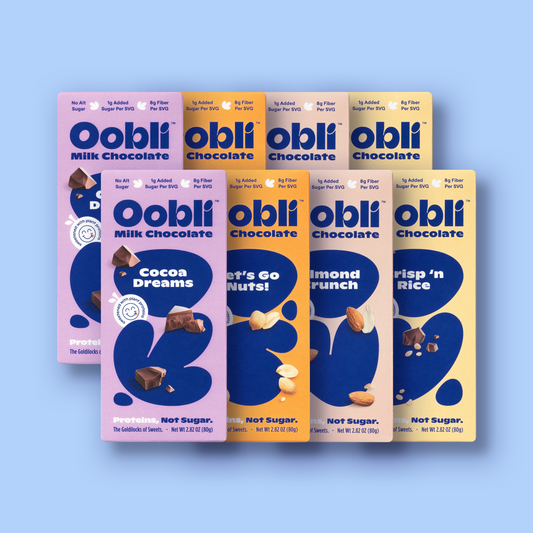Your diet is such an important part of your pregnancy. Not only do you have to manage cravings and avoid foods that make you feel instantly ill, you also have to understand what’s safe and unsafe for you and your developing baby. Unfortunately, it isn’t always an easy task...
There’s a long list of foods that should be avoided during pregnancy, as real scientific data exists showing how and why they’re harmful. But, for many foods, we don’t have that data, and we don’t always know what’s safe or unsafe, which can pose serious risks for you and your baby.
Because artificial sweeteners like aspartame are relatively new to our diets, there’s not as much long-term scientific research on their health effects. So, what about aspartame and pregnancy? Can you have aspartame while pregnant, or is it dangerous for you and the baby?
In this guide, we’ll explain what you need to know about consuming aspartame when pregnant. We’ll discuss the risks, introduce you to some safer alternatives, and give you all the information you need to keep you and your developing baby safe and healthy during this incredible period.
What is Aspartame?
Before we start talking about aspartame and pregnancy, let’s take a look at the sweetener itself. Aspartame is a low-calorie artificial sweetener that is widely used as a sugar substitute in various food and beverage products.
Composed of two amino acids, phenylalanine and aspartic acid, aspartame is known for its intense sweetness, approximately 200 times sweeter than regular sugar.
Aspartame is often used in the manufacturing of diet sodas, sugar-free desserts, chewing gum, and many other low-calorie or sugar-free products. Approved by the FDA, aspartame has been deemed safe for consumption by the general population, but less is known about aspartame and pregnancy.
There’s growing evidence to suggest that aspartame isn’t as harmless as it may seem. There are links between aspartame and hair loss, and some alarming research into the effects of aspartame on the brain, particularly when it comes to our mental health.
The dreaded aspartame headache, intolerance to artificial sweeteners symptoms, and aspartame withdrawal symptoms are just a few of the reasons why more and more people are turning to drinks without aspartame instead.
But what about aspartame and pregnancy? Is it safe to take aspartame while pregnant? Let’s explore what we know so far.
Can You Have Aspartame While Pregnant? Potential Risks of Consuming Aspartame During Pregnancy
So, is aspartame during pregnancy safe? There’s no simple answer either way, but we’re learning more and more about the health effects of aspartame every day. Here’s what we know so far about the potential risks of consuming aspartame while pregnant.
Potential Effects on Fetal Development
One alarming piece of research about aspartame and pregnancy shows us that when we consume aspartame, it’s broken down and its constituent parts can cross the placenta. In mice, the development of the placenta was impaired after aspartame consumption, leading to low fetal weights.
While the research is still in its early stages, these trends suggest that aspartame while pregnant may not be as safe as many people once believed.
Potential Impact on Maternal and Fetal Metabolism
The metabolism of aspartame involves the breakdown of its components, phenylalanine, and aspartic acid. High levels of phenylalanine may pose risks, especially if you have phenylketonuria (PKU) and you’re taking aspartame while pregnant.
While PKU is a rare genetic disorder, pregnant women with this condition must carefully monitor their phenylalanine intake to prevent potential harm to both maternal and fetal health. Consuming aspartame during pregnancy is almost certainly not safe if you’re in this category.
The Risk of Preterm Labor
During the breakdown of aspartame, one of the substances produced is methanol. Research in non-human primates has shown that even very low levels of methanol can result in shortened pregnancies and complications during labor - a nightmare for any expecting mother.
Increased Risk of Allergic Reactions
We all differ in our sensitivity to aspartame, and some people may experience allergic reactions. Even if you didn’t have an allergy to aspartame previously, hormonal changes during pregnancy can trigger all kinds of weird things, including new allergic responses.
While allergic responses to aspartame aren’t common, they can be serious during pregnancy. Not only does aspartame cause inflammation, but allergy symptoms include swelling of the lips, tongue, and throat, itchy, dry skin, and swollen salivary glands.
Possible Effects on Appetite and Weight Regulation
Aspartame is often used as a tool for weight management due to its low-calorie nature. However, many people believe that it actually has the opposite effect, and now there’s research to back it up - aspartame can increase your appetite and potentially cause weight gain.
Studies show that aspartame consumption over seven weeks increased weight and body fat percentage in a group of participants. While weight gain is of course a normal part of pregnancy, unhealthy weight gain caused by aspartame during pregnancy is a different story.
Altered Gut Microbiome Balance
Emerging research suggests a potential link between aspartame and alterations in the gut microbiome. The gut microbiome plays a crucial role in various aspects of health, and disruptions during pregnancy could have implications for both you and your growing baby.
Higher Autism Risk
A 2023 study found that daily aspartame consumption by pregnant or breastfeeding women tripled the chance that their male child would develop autism. No increased risks were found for baby girls whose mothers consumed aspartame during pregnancy.
So, is Aspartame Safe During Pregnancy, or Should You Avoid it?
While the FDA still considers aspartame safe, more and more research is starting to pile up that argues against consuming aspartame when pregnant. Aspartame may be safe for some women during pregnancy, but it also seems like there are some real, valid risks out there.
Your pregnancy diet and lifestyle are completely your choice, but given these links between aspartame and pre-term labor, altered fetal development, autism development, and more, is consuming aspartame when pregnant really worth the risk?
If you, like many women, decide that consuming aspartame during pregnancy isn’t worth the potential health dangers it can bring, we have some tips for finding natural, safer alternatives that don’t mean sacrificing your sweet tooth.
Tips on Avoiding Aspartame in Pregnancy and Finding a Safer Alternative
How can you avoid aspartame during pregnancy? Let’s take a look at the types of food and drink you’ll need to be cautious of, and what to consume instead of aspartame in pregnancy.
Common Foods and Beverages Containing Aspartame
The first step to avoiding aspartame in pregnancy is knowing where it’s usually found. You’ll see it lurking in many diet sodas, sugar-free desserts, and certain chewing gums. Labels like “sugar-free,” “diet,” or “low calorie,” usually point to sweeteners like aspartame.
Reading Labels: Hidden Sources of Aspartame
Aspartame may not always be obvious, as manufacturers hide it under various names in ingredient lists. Checking food labels for ingredients such as "aspartame," "phenylalanine," or "E951" will help you identify the foods and drinks you want to avoid.
Problems With Other Artificial Sweeteners
Replacing aspartame with other sweeteners may seem like a simple solution, but unfortunately it’s not as easy as that. When it comes to aspartame vs sucralose, sucralose brings its own health concerns, including weight gain and potentially even diabetes.
What about other sweeteners? Is stevia safe during pregnancy? Stevia may increase blood pressure, which means it’s not a great choice for expecting mothers. In terms of stevia vs Splenda, Splenda can cause bloating, headaches, and other things you don’t want to deal with while pregnant.
Is sugar alcohol bad for you if you’re pregnant? Sugar alcohols like sorbitol and erythritol can cause stomach upset and diarrhea, as well as more serious issues like increasing your risk of heart attack and stroke.
Exploring Natural and Safe Sweetener Alternatives
Given that all sweeteners seem to bring their own set of health concerns, is there anything you can safely eat and drink? Luckily, you can find low sugar drinks without artificial sweeteners.
With safe, natural options, you can enjoy your favorite foods and drinks without worrying about weight gain, keeping both you and your growing baby safe and healthy during your pregnancy.
Introducing Oobli: Snacks and Drinks Powered By Sweet Proteins
At Oobli, we’re not a fan of artificial sweeteners at all. To avoid all those scary health effects, we’ve created delicious treats sweetened naturally with powerful sweet proteins that are found in certain tropical fruits. Here’s everything you need to know about these revolutionary, safe snacks!
Why Sweet Protein?
Sweet proteins are a total game-changer when it comes to sweetening food and drinks. These small but mighty molecules are up to 4,000 times sweeter than sugar, meaning that only a tiny amount is needed ti give your favorite treats a naturally sweet flavor.
Sweet proteins don’t come with the side effects of artificial sweeteners, don’t cause intolerances or allergy symptoms, and won’t leave you feeling bloated. They don’t cause weight gain, are completely safe during pregnancy, and most of all, taste great!
Try Our Products Today and Taste the Difference!
The only way to really understand the benefits of sweet proteins is to try our incredible Oobli products for yourself. Our guilt-free, refreshing sweet iced tea contains just 7 grams of sugar in each tasty 16oz can. You’ll find all your favorite fruity tea flavors, without the calories.
If chocolate is more your style, you can find your new favorite, decadent dark chocolate bars here at Oobli. Our creamy bars are low in sugar, high in fiber, and made from 100% clean ingredients. Find your favorite flavor today!
Final Thoughts on Aspartame and Pregnancy
It can be tricky to navigate all the dos and don’ts of pregnancy, especially when there’s so much conflicting information out there. As the risks of aspartame during pregnancy become more clear, more and more women are switching to healthier, safer, alternatives.
At Oobli, we have the most delicious low-sugar options out there, allowing you to enjoy your favorite treats without worrying about sugar levels, calories, or the health of you and your baby. By harnessing the power of sweet proteins, our products are better, naturally!
Give yourself one less thing to worry about. Shop Oobli and keep you and your little one safe.




